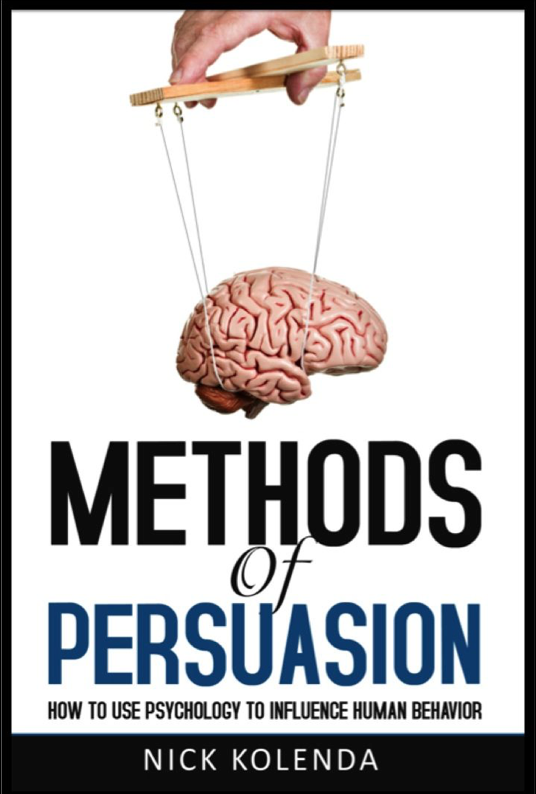Methods of Persuasion by Nick Kolenda is an applied psychology book about how to influence people. Kolenda is a ‘mind reader’ for entertainment purposes, though watching some of his acts on YouTube, he seems more one to dazzle the audience with psychology in general. It’s entertaining and surprising to watch, and probably quite useful to him.
by Nick Kolenda is an applied psychology book about how to influence people. Kolenda is a ‘mind reader’ for entertainment purposes, though watching some of his acts on YouTube, he seems more one to dazzle the audience with psychology in general. It’s entertaining and surprising to watch, and probably quite useful to him.
Which brings me to the question–what are the ethics of teaching someone to ‘pull the strings’ on someone else’s brain? I’m not going to go into that right now. Something tells me its a long discussion, and that it probably doesn’t really matter that much. But Kolenda seems to know that a lot of people picking up this book are likely to have nefarious intent in mind, so he chooses his examples and analogies carefully.
But truthfully, outside of an entertainment arena, its hard to imagine Kolenda’s techniques here being intentionally used for anything but manipulation. It’s a fine line, I suppose, between manipulation and persuasion. I digress.
“Methods” is actually an acronym in Kolenda’s book.
- “Mold their perception”
- “Elicit congruent attitudes”
- “Trigger social pressure”
- “Habituate your message”
- “Optimize your message”
- “Drive their momentum”
- “Sustain their compliance”
Clever right?
Reading a lot of marketing and sales books like I do, there weren’t too many surprises in here. But, where other books do a more thorough job of explaining the underlying psychology concepts, Kolenda’s book, and his experience as an entertainer, does a better job of representing those concepts when the rubber hits the road.
One of his running examples is of a mother who wants to convince her husband to take the two of them and their daughter to Disney World. The example is repeatedly useful in explaining how each concept might work in real life. But… who wants to be married to such a manipulative person?
From priming the mind to expect certain outcomes, to hacking what it is that makes us like something or someone, the book goes through it all in a pretty quick and dirty fashion. I think the advice and perspective here is a nice compliment to much of the similar literature out there today. But, by itself, I think it’s mostly just fun to read. And that’s probably a good thing, because influence really is hackable and it’s probably best that no one’s going to become a master of it after reading a couple hundred pages of some book.

Recent Discussion